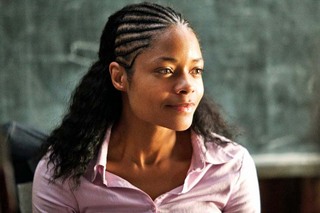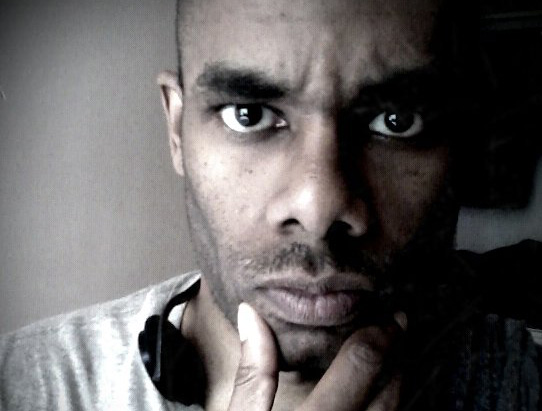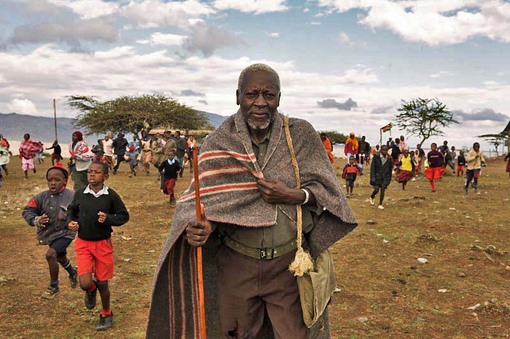“The First Grader” is streaming On Demand via Amazon and Vudu, and the DVD is on Netflix and on sale.
It doesn’t matter that “The First Grader” is as shamelessly, sappily manipulative as that TV commercial where Sarah Mclachlan wails a tune while the camera zooms in on miserable animals peering out of their rescue shelter cages. Nope. It doesn’t even matter that the musical score, which I will give the alternate title “Mother Africa Weeps,” is the World Music equivalent of an Oreo McFlurry — a real pancreas-buster. Never mind all that. The imagery in “The First Grader” places it on par with cinema’s great sentimental masterpieces, “Umberto D,” “Tokyo Story” and “Ikiru.” From the first frame, this film warns that it is working in a universe of pure emotion.

The film’s true story concerns Maruge (Oliver Litondo), a former Kenyan freedom fighter and political prisoner who has been forgotten in the post-colonial age. He walks around the countryside in rags while the new generation of power brokers benefiting from his sacrifices zip through Nairobi in Benzes. When he learns that the government is now offering free education to all, he tries to enroll in a local elementary school. He’s illiterate, it turns out, and he wants to learn how to read an important old letter for himself. Of course, the 84 year-old has a tough time convincing the overcrowded one-room schoolhouse to let him in.


British director Justin Chadwick dramatizes this struggle in operatic, windblown close-ups and momentous slow dolly shots. Every scene shimmers from blaring equatorial sunlight passing through prairie dust. In this light, Maruge’s face is a monument to his years in prison. Pride, humility and deep trauma mark every expression. Naomie Harris, as the schoolteacher who fights the system on his behalf, looks like an angel. In flashbacks, Maruge’s long-dead wife appears just as luminous. And the little schoolchildren in their rumpled uniforms are as spontaneously adorable as you might expect. (If this film is up for Oscar consideration, I’ll bet there’s a planeload of Academy voters already en route to Kenya seeking mass adoptions.)



The brown beauty and nobility on display shake a fist at centuries of white supremacist brainwashing. Compare this film to an Africa-fetish project like “The Last King of Scotland,” in which the only black face that wasn’t scary, vaguely captured or comical was that of Hollywood starlet Kerry Washington. Or “The Constant Gardener,” in which the only distinct non-white personage Fernando Meirelles’ fidgety camera took a moment to settle on was the infant nursing at Rachel Weisz’s breast. Or Clair Denis’ “White Material,” a portrait of white settlers fleeing a fictional nation of surly, thuggish Africans. Or “District 9,” which managed to make roaches from outer space more endearing than black South Africans.
“The First Grader” is simply in love with Kenyan accents and Kenyan ways. The appreciation is superficial only in the sense that one can shed real tears at the sight of a stranger’s wedding. A radio DJ provides running commentary on Maruge’s fight to enter the first grade — a comic-relief cliche that feels brand new here, through Chadwik’s lens.


I know what some of you are thinking. You are thinking the same eye-rolling thought that folks have when a certain politically popular work of literature cops a Nobel Prize, or when “Roots” marathons air on TV: What do any of these noble intentions have to do with the quality of the work? Well, in this case, everything. While Chadwick cheats the acting toward the adorable side, cinematographer Rob Hardy studies all the faces and gestures, most of them native Kenyan non-actors, with the concentration of an ethnographic documentarian. It reminded me of all the comical cutesploitation in the Botswana-set HBO adaptation of “The No. 1 Ladies’ Detective Agency” (or as I re-titled it, “Africans Say the Darndest Things”). The difference in “The First Grader” is that its sincere sweetness pushes up against brutal tragedies glimpsed in its flashbacks to the Mau Mau Rebellion. One definitely senses an agenda at work, to show how past colonial dehumanization of blacks (and exploiting tribal divisions, Rwanda-style) produced lingering problems in modern Kenya.


All over the African diaspora, the image of blacks as coarse subhumans persists while, in cinema and television, a vast mythology of white awesomeness is on its third or fourth re-boot. Terence Malick’s “The Tree of Life” is a compendium of classic white-is-beautiful imagery, but with a few devastating child’s-eye glances at the poor and wretched, some of them brown. As with “The First Grader,” that film’s power is largely a matter of wondrous natural-light cinematography and faces that bring their own light. Malick’s poetic manner of organizing scenes and mixing the sound give it all a dreamlike, alchemical quality. If only somebody could have drafted him to supervise the post-production of “The First Grader.” No shuffling of scenes or shots necessary; just swapping out the canned World music for sounds that would not undercut all those melodious voices and regal faces would do fine. (And while he’s at it, maybe remix “Endurance,” the slick, biopic of Ethiopian runner Malick produced in 1999. But I digress…)

As it is, “The First Grader” is still too lovely to be denied. Ignatiy Vishnevetsky argued that this movie presents a Westerner’s scrubbed, patronizing view of Kenya. Possibly, but what of it? That Italian neorealist classic of tear extortion, “Umberto D,” features a scene of an adorable puppy dog holding a fedora in his teeth to beg for change on behalf of an equally adorable but too-proud old pensioner surviving post-WWII austerity. It’s enough to make the horse in “War Horse” shout, “horseshit!” Doesn’t matter. As with “The First Grader,” we are too busy confronting the truth of the real-life situation, rendered beautifully in the faces of those living through it.
– – – –

Steven Boone is a writer-at-large at Capital New York , conrtibutor to Fandor’s Keyframe blog and Indiewire’s Press Play blog http://blogs.indiewire.com/pressplay/. He experiments with images and video at Hentai Lab.












